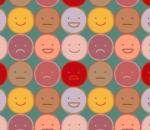The brains of people with schizophrenia may respond differently to social rewards than those of neurotypical individuals, according to a recent study by UCLA researchers.
Junghee Lee, the study’s first author and an assistant research psychologist at the UCLA Semel Institute for Neuroscience and Human Behavior, said the findings could eventually translate into a treatment for the difficulties schizophrenic individuals face in social interactions.
Schizophrenia is a mental disorder that affects a person’s thoughts, feelings and behaviors, with symptoms ranging from problems understanding social interactions to hearing voices or believing others plotting to harm them, according to the National Institute of Mental Health and the Semel Institute.
Social interactions are often difficult for schizophrenic patients because they have more trouble identifying the emotions in faces or voices and inferring what other people are thinking, said Michael Green, a senior author of the study and chief of Green Lab, where the study was conducted.
The study compared the brain activity of schizophrenic individuals and neurotypical individuals in response to social rewards, such as smiling faces, and nonsocial rewards, such as money, Green said.
To measure this, the researchers examined activity in two regions of participants’ brains as they performed a learning task that involved a game with slot machines in which some participants received better payoffs than others. Participants learned over the course of the study which machines were better at providing rewards.
While both groups showed similar brain activity in response to nonsocial rewards, the schizophrenic individuals showed lower brain activity in response to social rewards than neurotypical individuals, Lee said.
Green added this reflects a difference in responses to social factors in the environment or social stimuli between the groups. Neurotypical individuals tended to be more sensitive when a reward was social rather than nonsocial, while schizophrenic patients were less sensitive to social rewards.
“That suggests that there isn’t that same kind of a fine-tuning towards social stimuli in our patients,” Green said.
The way schizophrenic patients process stimuli has direct implications to their lives, Lee said.
“If (they) don’t find other people’s behaviors rewarding, that’s going to affect their every day because that means they cannot actually change their behavior based on feedback from another person,” Lee said.
Lee added if the findings are confirmed or replicated, other researchers could develop treatment programs that target the way the brain processes social rewards in order to improve social functioning in individuals with schizophrenia.
Erin Heerey, an associate professor of psychology at the University of Western Ontario, said while it is worth further exploring this topic, people should be careful when interpreting the study, since behavior can differ in real social settings.
“We don’t actually know how social rewards relate to face-to-face social behavior,” Heerey said.
She added researchers may not know enough about how the brain processes social and monetary rewards to compare the two in a scientific setting.
Green added while studying social motivation is common, the study displayed a new concept in schizophrenia research as it examines social motivation on a neural level.
“The topic isn’t novel,” Green said. “It’s taking it to the neural level, which was innovative.”
Lee said she has received funding for a second study, in which she plans to conduct similar research on patients in an earlier stage of schizophrenia.
“We want to see whether this phenomenon – this reduced sensitivity to social rewards – is present at the early stage of illness,” Lee said. “If that’s the case I think that kind of narrows down when we can actually intervene to help them.”
